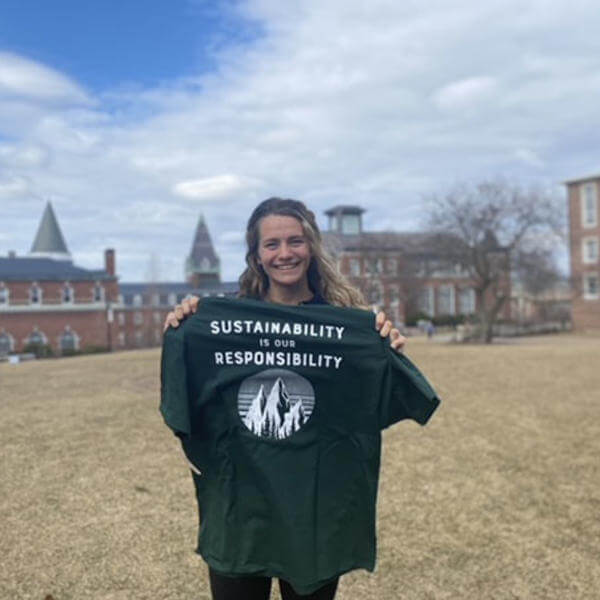When the College's student-led Eco-Action group was canvassing for student votes for the Holy Cross Green Fund last year, Kimberly Fetherston '22 went to the place she knew she'd get results. "That was my first campaign," she remembers. "I immediately went to talk to people on the Hoval. I walked around for hours, explaining the importance of the Fund, talking about what it would do for the College, and asking people: 'Have you voted for the Green Fund yet?'"
That grassroots effort was undeniably effective, with 78% of students ultimately voting to implement the Green Fund, which is now used for student-run projects to promote sustainability on campus. A similar advocacy effort by the group last year resulted in the successful addition of a Director of Sustainability position at the College. But as a new semester begins, Eco-Action, like many groups and organizations, is rethinking their communications to fit the new reality of a world in the midst of a pandemic. "This is one of our biggest issues this semester—to not be able to just bother people on the Hoval," Fetherston, co-chair of Eco-Action and an English major with an environmental studies minor, says. "But we're making use of social media and every tool we have, and we're finding ways to get out there and grow our online presence, followers and the kind of content we offer."
As their communications efforts shift from stickers and brochures to social media posts and virtual advocacy, Eco-Action isn't dialing back their mission during the remote semester. "Our mission continues to be educating students, faculty and staff about sustainability issues globally," says Renée LeBlanc '21, co-chair of Eco-Action and an environmental studies and political science double major. "We want to really direct our mission toward environmental justice this year and create more ways to empower people to address environmental inequalities in their area."
"When we have the opportunity, we are taking it," explains LeBlanc. "We can't have a farmers' market on campus this semester, but we are doing EcoTeams, an interactive, small group-based challenge to complete tasks over time—for example, calling a local congressperson about an environmental issue and sending in a screenshot of the call—and giving the winning team at the end of the semester a gift basket. We're focused right now on voter registration to ensure students know about which issues are environmental votes. And we're putting together resources so people who want to learn more can watch documentaries or read recommended books to continue their education on sustainability topics." Ultimately, the students hope to partner with professors to incorporate some of these resources into classes in the College's environmental studies department.
The group also plans to hold environmental justice webinars, in collaboration with the environmental studies department, which will allow students access to experts and leaders in sustainability. Here, the student co-chairs see a silver lining—while the group has always brought in speakers, the remote nature of this semester's speaker forums opens new and exciting possibilities for the speaker pool. And as LeBlanc notes: "The nice part is that it’s better for the environment for them to not travel, so it works out!"
Despite their current lack of access to students on the Hoval, LeBlanc and Fetherston are focusing on the benefits to the semester's remote environment. In addition to being able to more actively engage students' local towns and communities to take more of a stand on environmental issues, this semester can be an opportunity to be sustainability ambassadors to family and friends. "When you're home, you have more of an opportunity to interact with your family and you can take time to apply what you’ve learned from Eco-Action," says LeBlanc. "Take a look around and see where there's an opportunity for improvement: what type of energy is your family really using, and how much? We can encourage people to pay better attention to what's coming in and out of their home every single day."
Some of Eco-Action's recommendations for small ways in which students can start living more sustainably include:
1) Focus on water usage to maximize the impact of the water you're using—only run the washing machine or dishwasher with full loads, use cold water over hot water whenever possible (it uses less energy) and air-dry your clothing. Shower to a two-song playlist.
2) Use natural light as a simple way to save on energy—sit next to a window to read or study on a nice day with natural light (bonus: it will be easier on your eyes!).
3) Considering purchasing from sustainable companies when shopping online. (Don't know where to start? Read this interview with Ellis Jones, assistant professor of sociology.) Eat and shop local. When you're food shopping, pay attention to what kind of food you are buying—for example, transitioning to oat or soy milk from cow's milk cuts down on emissions.
For more tips like these and for information on how to join Eco-Action, follow their Instagram at @hcecoaction or email Eco-action@holycross.edu.
Eco-Action Co-Chairs Focus on Virtual Sustainability Efforts

The student-led group is innovating outreach activities for a remote semester
Read Time
4 Minutes

